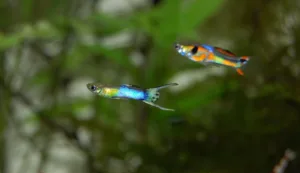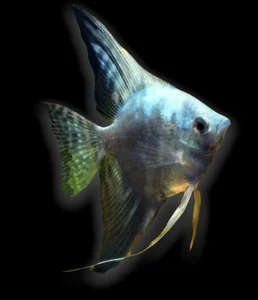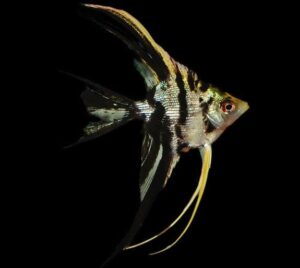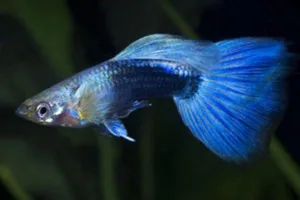Angelfish, with their striking appearance and graceful movements, are a captivating addition to any aquarium. However, to create a thriving and harmonious aquatic ecosystem, it’s crucial to comprehend their behavior and compatibility. In this comprehensive guide, we’ll delve into the intricate world of angelfish, exploring their behavior and offering insights on how to ensure compatibility with other fish in your aquarium.
Angelfish are popular aquarium fish known for their graceful swimming, elegant fins, and striking coloration. They are generally considered peaceful fish, but they can be territorial and aggressive towards other angelfish or smaller fish, especially during breeding season.
I. Angelfish Behavior
Angelfish are known for their intriguing behavior, which reflects their natural instincts and characteristics as cichlid fish. Understanding their behavior is essential for creating a suitable environment in your aquarium.
A. Territorial Nature
Angelfish are not known for their aggression, but they can be territorial in certain situations. During territorial disputes, they may exhibit aggressive behavior. Here’s what you need to know about their territorial tendencies:
- Establishing Territories: Angelfish may establish territories within your aquarium, especially when breeding. This behavior is more pronounced in mature individuals. They stake out areas they consider their own, and intruders are met with hostility.
- Minimizing Aggression: To reduce aggression and territorial disputes, it’s essential to provide adequate hiding spots and visual barriers in your tank. This allows angelfish to establish boundaries and retreat when needed.
B. Schooling Tendencies
Angelfish exhibit schooling tendencies, which are related to their natural habitat and social behavior. Keeping them in a suitable group can enhance their well-being and natural behavior:
- In the Wild: Angelfish are often found in schools in their natural habitat. Schooling provides safety and a sense of community. Replicating this environment in your tank can reduce stress and encourage natural behavior.
- Ideal Group Size: Aim to keep at least 3-4 angelfish together in your aquarium. A small group offers companionship and mimics their natural schooling behavior. Ensure that your tank size can accommodate the group comfortably.
C. Exploratory Behavior
Angelfish are known for their curious and exploratory nature. Understanding their exploration patterns can help you create a more engaging and stimulating environment for them:
- Natural Behavior: Angelfish tend to explore their surroundings, swimming in the middle to upper levels of the aquarium. They are not typically bottom-dwellers, although they may occasionally visit the lower regions of the tank.
- Environmental Enrichment: To cater to their exploratory behavior, provide a diverse and well-decorated tank. Utilize a variety of plants, decorations, and driftwood to create an interesting and engaging habitat.
D. Breeding Behavior
Breeding is a significant aspect of angelfish behavior. Understanding their breeding behavior is crucial if you plan to breed them or wish to maintain a peaceful community tank during breeding periods:
- Protective Nature: During breeding, angelfish become more protective and may exhibit aggressive behavior. This protective instinct is particularly directed at other fish that approach their chosen spawning site.
- Breeding Setup: If you plan to breed angelfish, consider setting up a separate breeding tank to provide a safe and controlled environment. This minimizes disturbances and territorial disputes in the main community tank.
II. Compatibility with Other Fish
When keeping angelfish in a community tank, compatibility with other fish is essential to maintain a peaceful and harmonious environment. Here’s what you need to know about angelfish compatibility:
A. Tank Mates
Angelfish are generally peaceful and can coexist with a variety of other community fish. However, it’s crucial to choose tank mates wisely to ensure compatibility:
- Peaceful Species: Angelfish are best paired with peaceful species that are unlikely to provoke aggression. Suitable tank mates include tetras, gouramis, rasboras, and other peaceful cichlid species like the German blue ram.
- Avoid Aggressive Species: Avoid keeping angelfish with aggressive or fin-nipping species, as these can lead to conflicts and stress for your angelfish. Aggressive barbs or larger, more assertive cichlids should be avoided.
B. Tank Size
The size of your aquarium plays a significant role in angelfish compatibility. Providing adequate space can help reduce territorial conflicts and aggression: The Beginners Guide On How to Set Up a Angelfish Tank
- Minimum Tank Size: Angelfish require a tank that is at least 20-30 gallons in size for a small group of individuals. Larger tanks are preferable, as they offer more swimming space and reduce the chances of territorial disputes.
- Swimming Space: The height of your tank is particularly important, as angelfish are tall fish with long fins. Ensure your tank is sufficiently tall to accommodate their vertical swimming patterns. The Best Filters for Angelfish: A Comprehensive Guide
C. Water Parameters
Maintaining appropriate water parameters is vital for angelfish health and compatibility with other fish: Choosing an Angelfish: Tips for Selection and Tank Setup
- pH Range: Angelfish prefer slightly acidic to neutral water, with a pH range of 6.0 to 7.5. Monitoring and adjusting the pH to stay within this range is important.
- Temperature Range: Keep the water temperature within the range of 75-82°F (24-28°C). This temperature range mimics their natural habitat and promotes overall well-being.
D. Providing Hiding Places
Creating an environment with adequate hiding spots and territorial boundaries is essential for reducing stress and aggression:
- Plants and Decorations: Utilize live or artificial plants, driftwood, and decorations to create hiding spots and territorial boundaries. These elements not only enhance the aesthetics of your tank but also provide essential refuge for angelfish and other tank mates.
E. Feeding Requirements
Proper nutrition is crucial for the health and compatibility of angelfish with other tank mates: Freshwater Angelfish Diet and Feeding
- Omnivorous Diet: Angelfish are omnivorous and accept a variety of foods. Ensure a well-balanced diet by offering high-quality flakes, pellets, and a mix of live or frozen foods like brine shrimp, bloodworms, and daphnia.
F. Breeding Considerations
If you plan to breed angelfish, specific considerations are necessary to maintain compatibility with other tank mates: Breeding Angelfish: A Comprehensive Guide
- Breeding Pairs: Breeding angelfish can become more aggressive during the breeding process. It’s essential to separate breeding pairs into a dedicated breeding tank or provide adequate hiding spots in the main tank to protect other fish from territorial disputes.
G. Monitoring Aggression
Regularly observe your angelfish’s behavior and interactions with other fish in the tank. If you notice excessive aggression or signs of stress, consider taking steps to address the issue, such as rearranging the tank layout or removing the most aggressive individuals. Angelfish Diseases: Common Ailments and Effective Treatments
YouTube Video angel Fish behavior
In conclusion, angelfish are captivating and graceful additions to your aquarium, but understanding their behavior and ensuring compatibility with other fish is crucial for their well-being and the harmony of your aquatic ecosystem. By providing a suitable environment, selecting appropriate tank mates, and monitoring their behavior, you can create a thriving and visually stunning aquarium that showcases the beauty and elegance of angelfish. Angelfish Care Guide | Tips for Breeding, Best Tank Setup, tankmates and more











